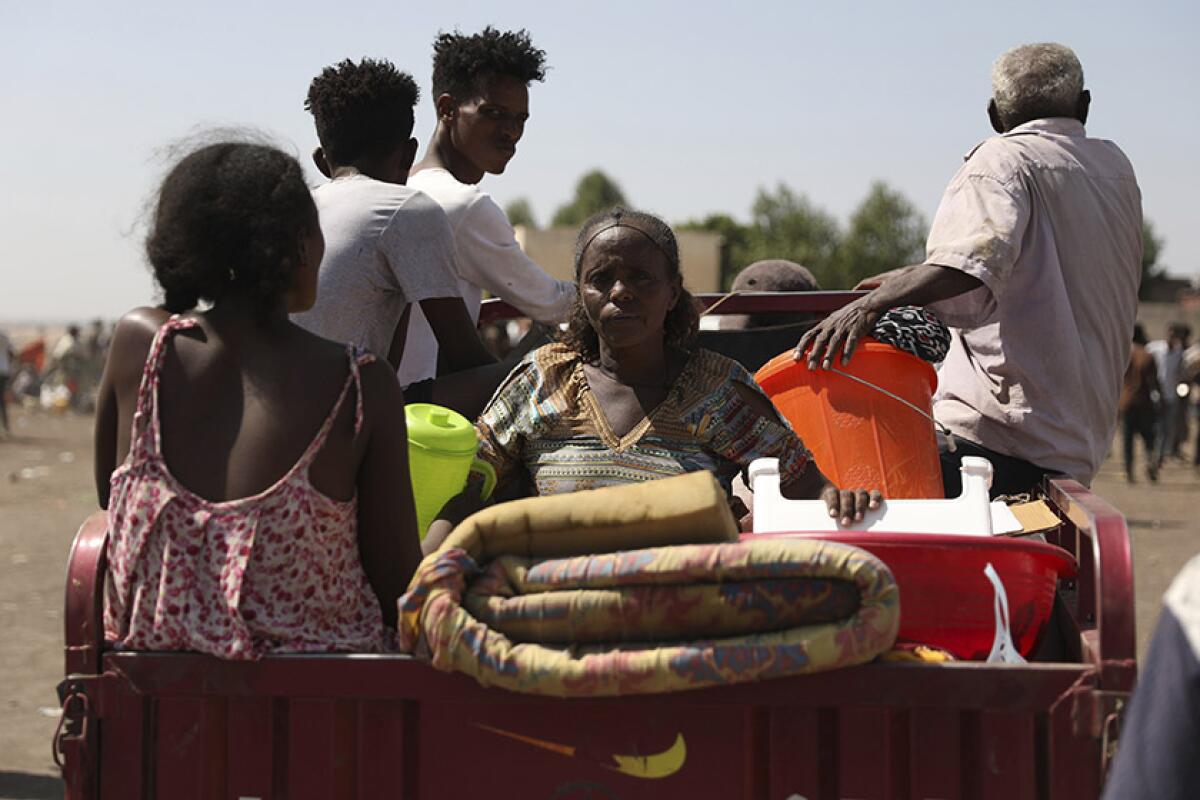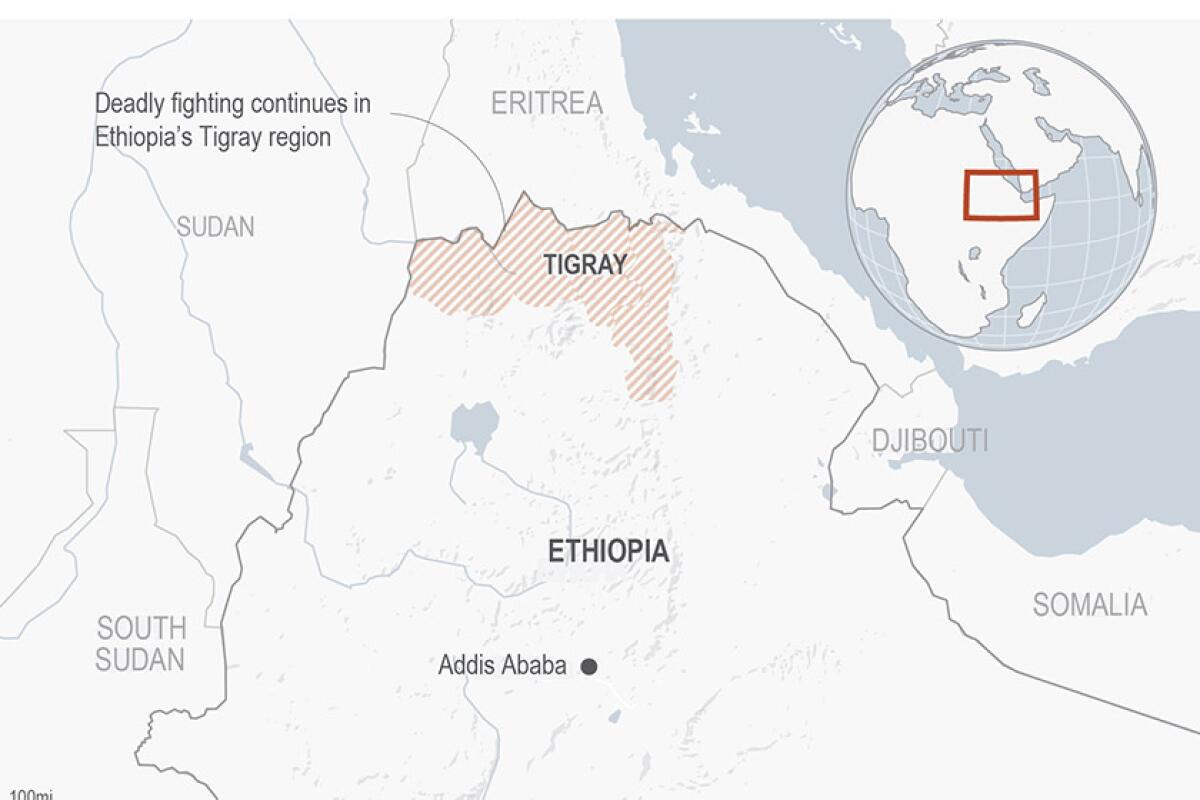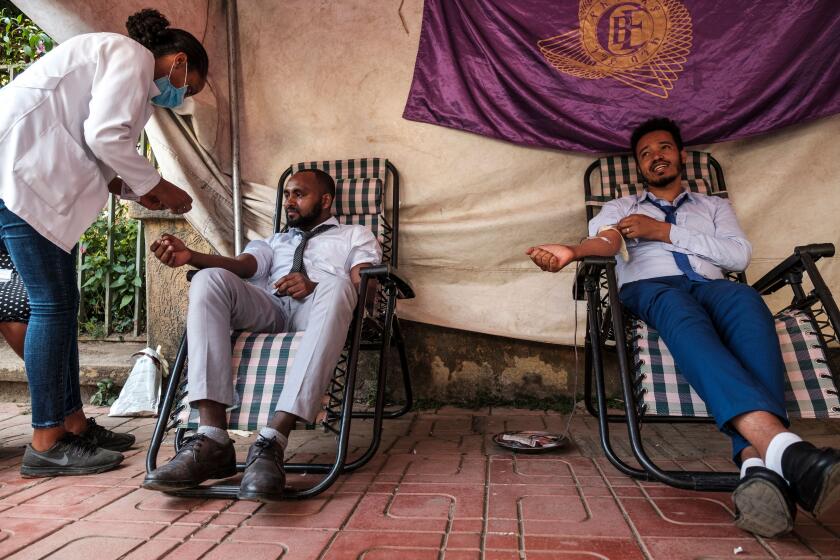Ethiopia’s Tigray leader confirms firing missiles at Eritrea

NAIROBI, Kenya — The leader of Ethiopia’s rebellious Tigray region has confirmed firing missiles at neighboring Eritrea’s capital and is threatening more, marking a huge escalation as the deadly fighting in northern Ethiopia between Tigray forces and the federal government spills across an international border.
Tigray regional President Debretsion Gebremichael, in a phone interview Sunday with the Associated Press, would not say how many missiles were fired at the city of Asmara on Saturday but said it was the only city in Eritrea that was targeted.
“As long as troops are here fighting, we will take any legitimate military target and we will fire,” he said, accusing Eritrea of sending troops into the Tigray region and denying reports that Tigray regional forces have entered Eritrea.
“We will fight them on all fronts with whatever means we have,” he said. He asserted that around 16 Eritrean divisions are fighting in what he called a “full-scale war.”
The brewing civil war in Ethiopia between a regional government that once dominated the country’s ruling coalition, and a Nobel Peace Prize-winning prime minister whose sweeping reforms marginalized the Tigray region’s power, could fracture a key U.S. security ally and destabilize the strategic Horn of Africa, with the potential to send scores of thousands of refugees into Sudan.
Ethiopia nears civil war, threatening the stability of one of the world’s most strategic regions. Here are key reasons for the international alarm.
At least three rockets appeared to be aimed at the airport in Eritrea’s capital, Asmara, hours after the Tigray regional government on Saturday warned it might attack. It has accused Eritrea of attacking it at the invitation of Ethiopia’s government after the conflict erupted Nov. 4 with an attack by regional forces on a federal military base in the Tigray region.
In a security alert, the U.S. Embassy in Eritrea said “a series of loud noises were heard in Asmara” on Saturday night, and “unconfirmed reports indicate they may have been explosive devices believed to be in the vicinity of the Asmara International Airport. There are no indications the airport was struck.”
The Tigray regional leader would not say how many missiles remain at his troops’ disposal but said, “We have several. We can use it selectively, anywhere.” When asked about possibly targeting Ethiopia’s capital, Addis Ababa, he replied: “I don’t want to tell you, but the missiles are long-range as well.”
Eritrean officials have not responded to requests for comment, and there was no immediate comment on the missile attack from Ethiopia’s federal government.
The Tigray leader said he had no communication with Ethiopia’s federal government. The African Union is pushing for a cease-fire, he said, “but the prime minister is not ready to listen. He believes in the might he has.” He called this a “really messy situation which requires international intervention.”
Tigray’s heavily armed regional government broke away from Ethiopia’s ruling coalition last year, and it objects to the postponement of national elections until next year, which extends Prime Minister Abiy Ahmed’s rule. In September it held a regional election in defiance of Abiy.
Each side regards the other as illegal, and the federal government now says members of the Tigray region’s ruling “clique” now must be arrested and their well-stocked arsenal destroyed. Abiy calls it a “law enforcement action” while his military officials call it war.

The Tigray leader told the AP he didn’t have an exact number of people killed in the fighting but said “a very massive displacement is happening. The fighting is happening on all fronts, in addition to airstrikes.” He added, “we have to defend ourselves, you know?”
The Tigray region is boxed in among Ethiopian forces, Eritrea and Sudan, which has closed its border but allows in refugees.
The Tigray leader said his government, the Tigray People’s Liberation Front, has had no communications channel with Eritrea, even before the conflict. The two sides are at bitter odds after a long and deadly border war that ended after Abiy took office in 2018.
Abiy has rejected pleas by the international community for an immediate deescalation as his government refuses to regard the TPLF as an entity to negotiate with.
Another senior TPLF official, Getachew Reda, in a statement posted on social media asserted that Ethiopia’s prime minister “is now enlisting the support of UAE drones based in [the Eritrean city of] Assab in his devastating war against the people of Tigray.” He offered no evidence to back the claim.
The United Nations and others have warned of a looming humanitarian disaster as some 25,000 Ethiopian refugees, hungry and scared, have fled the Tigray region into Sudan. Communications and transport links with the Tigray region remain almost completely severed, and millions are at risk as food, fuel and other supplies run low.
More to Read
Sign up for Essential California
The most important California stories and recommendations in your inbox every morning.
You may occasionally receive promotional content from the Los Angeles Times.











